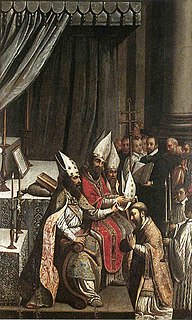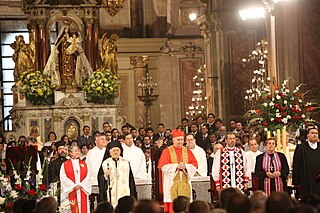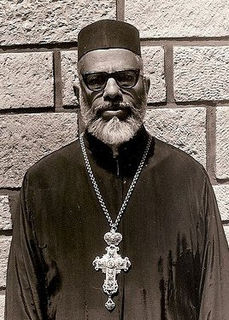
Apostolic succession is the method whereby the ministry of the Christian Church is held to be derived from the apostles by a continuous succession, which has usually been associated with a claim that the succession is through a series of bishops. Christians of the Roman Catholic, Eastern Orthodox, Oriental Orthodox, Old Catholic, Moravian, Hussite, Anglican, Church of the East, and Scandinavian Lutheran traditions maintain that "a bishop cannot have regular or valid orders unless he has been consecrated in this apostolic succession." Each of these groups does not necessarily consider consecration of the other groups as valid.

The World Council of Churches (WCC) is a worldwide Christian inter-church organization founded in 1948 to work for the cause of ecumenism. Its full members today include the Assyrian Church of the East, the Oriental Orthodox Churches, most jurisdictions of the Eastern Orthodox Church, the Old Catholic Church, the Lutheran Churches, the Anglican Communion, the Mennonite Churches, the Methodist Churches, the Moravian Church and the Reformed Churches, as well as the Baptist Churches and Pentecostal Churches. Notably, the Catholic Church is not a full member, although it sends delegates to meetings who have observer status. The WCC arose out of the ecumenical movement and has as its basis the following statement:
The World Council of Churches is a fellowship of churches which confess the Lord Jesus Christ as God and Savior according to the scriptures, and therefore seek to fulfill together their common calling to the glory of the one God: Father, Son and Holy Spirit.
It is a community of churches on the way to visible unity in one faith and one eucharistic fellowship, expressed in worship and in common life in Christ. It seeks to advance towards this unity, as Jesus prayed for his followers, "so that the world may believe".
Full communion is a communion or relationship of full agreement among different Christian denominations that share certain essential principles of Christian theology. Views vary among denominations on exactly what constitutes full communion, but typically when two or more denominations are in full communion it enables services and celebrations, such as the Eucharist, to be shared among congregants or clergy of any of them with the full approval of each.

Ecumenism, also spelled oecumenism, is the concept and principle in which Christians who belong to different Christian denominations work together to develop closer relationships among their churches and promote Christian unity. The adjective ecumenical is thus applied to any interdenominational initiative that encourages greater cooperation between Christians and their churches.

In Christian theology, the term Body of Christ has two main but separate meanings: it may refer to Jesus' words over the bread at the celebration of the Jewish feast of Passover that "This is my body" in Luke 22:19–20, or it may refer to all individuals who are "in Christ" 1 Corinthians 12:12–14.

Catholic charismatic renewal is a movement within the Roman Catholic Church that is part of the wider charismatic movement across historic Christian Churches. It has been described as a "current of grace". It began in 1967 when Catholics from Duquesne University attended a Protestant worship service and claimed to have been "bapitized in the Holy Spirit". It is heavily influenced by American Protestantism, especially Pentecostalism, with an emphasis on having a "personal relationship with Jesus", deep emotional experiences, and expressing the "gifts of the Holy Spirit".
Catholic–Lutheran dialogue is a series of discussions which began during July 1964 as an outgrowth of the Second Vatican Council. These gatherings reflect the new openness of the Roman Catholic Church to dialogue with other Christian denominations as well as other religions. These dialogues have been primarily between by church representatives of the Lutheran World Federation and representatives of the Pontifical Council for Promoting Christian Unity.
The Reformed Episcopal Church (REC) is an Anglican church of evangelical Episcopalian heritage. It was founded in 1873 in New York City by George David Cummins, formerly a bishop of the Protestant Episcopal Church.
Geoffrey Wainwright was an English theologian. He spent much of his career in the United States and taught at Duke Divinity School. Wainwright made major contributions to modern Methodist theology and Christian liturgy, and played a significant role on producing the text Baptism, Eucharist and Ministry, as a member of the Faith and Order Commission of the World Council of Churches (WCC).

Catholicity is a concept pertaining to beliefs and practices widely accepted across numerous Christian denominations, most notably those that describe themselves as Catholic in accordance with the Four Marks of the Church, as expressed in the Nicene Creed of the First Council of Constantinople in 381: "[I believe] in one, holy, catholic, and apostolic Church."

The Catholic Church has engaged in the modern ecumenical movement especially since the Second Vatican Council (1962-1965) and the issuing of the decree Unitatis redintegratio and the declaration Dignitatis humanae. It was at the Council that the Pontifical Council for Promoting Christian Unity was created. Before that time, those outside of the Catholic Church were categorised as heretics or schismatics.

The General Commission on Christian Unity and Interreligious Concerns (GCCUIC) addresses the interreligious and ecumenical concerns of The United Methodist Church. The GCCUIC's office is located at The Interchurch Center in New York City. The Commission's President is Bishop Mary Ann Swenson and the General Secretary is Rev. Dr. Stephen J. Sidorak, Jr.. The Ecumenical Officer of the Council of Bishops is Bishop Sharon Zimmerman Rader and serves as the corporate ecumenical officer of The United Methodist Church, working in collaboration with GCCUIC.

Anglican interest in ecumenical dialogue can be traced back to the time of the Reformation and dialogues with both Orthodox and Lutheran churches in the sixteenth century. In the nineteenth century, with the rise of the Oxford Movement, there arose greater concern for reunion of the churches of "Catholic confession". This desire to work towards full communion with other denominations led to the development of the Chicago-Lambeth Quadrilateral, approved by the Third Lambeth Conference of 1888. The four points were stipulated as the basis for church unity, "a basis on which approach may be by God's blessing made towards Home Reunion":

The Faith and Order Commission is an assembly group within the World Council of Churches founded in 1948 which has made numerous and significant contributions to the ecumenical movement.

V. C. Samuel; Malayalam: വി.സി. ശമുവേൽ; Hebrew :שְׁמוּאֵל ; Greek: Σαμουήλ; Arabic: صموئيل; Latin:Samūēl; Amharic: ሳሙኤል
Paul David Loup Avis is an Anglican priest, theologian and ecumenist. He was General Secretary of the Church of England’s Council for Christian Unity from 1998 to 2011, Theological Consultant to the Anglican Communion Office, London, from 2011 to 2012, and Canon Theologian of Exeter Cathedral, 2008-2013. He is currently Honorary Professor in the Department of Theology and Religion, Durham University, UK. At the University of Exeter he was Visiting Professor of Theology, 2009-17 and is currently Honorary Research Fellow. He is Director of the Centre for the Study of the Christian Church which organises occasional conferences and is linked to the journal Ecclesiology, published by Brill, of which he is Editor-in-Chief. He is the Editor of the series 'Anglican-Episcopal Theology and History', also published by Brill. Paul Avis was also a Chaplain to Her Majesty Queen Elizabeth II, 2008-17.

A sacrament is a Christian rite recognized as of particular importance and significance. There are various views on the existence and meaning of such rites. Many Christians consider the sacraments to be a visible symbol of the reality of God, as well as a channel for God's grace. Many denominations, including the Catholic, Lutheran, Anglican, Methodist, and Reformed, hold to the definition of sacrament formulated by Augustine of Hippo: an outward sign of an inward grace, that has been instituted by Jesus Christ. Sacraments signify God's grace in a way that is outwardly observable to the participant.

The Liturgy of Addai and Mari is the Eucharistic liturgy belonging to the East Syriac Rite and was historically used in the Church of the East of the Sasanian (Persian) Empire. This liturgy is traditionally attributed to Saint Addai and Saint Mari. It is currently in regular use, in the Assyrian Church of the East of Iraq, the Ancient Church of the East of Iraq, the Syro-Malabar Church of India, and the Chaldean Catholic Church of Iraq. The latter two are Eastern Catholic churches in full communion with the Holy See of Rome.
Jeffrey Gros was an American Catholic ecumenist and theologian. A member of the De La Salle Christian Brothers, Gros had served as a high school history teacher, university professor, associate director of the Secretariat for Ecumenical and Interreligious Affairs at the United States Conference of Catholic Bishops; director of Faith and Order for the National Council of Churches; and president of the Society for Pentecostal Studies. He is the author or editor of over 20 books, 310 articles, and an uncounted number of book reviews. He died of pancreatic cancer in Chicago, IL, on 12 August 2013 at the age of 75.

The Lima Liturgy is a Christian ecumenical Eucharistic liturgy. It was written for the 1982 Plenary Session of the Faith and Order Commission of the World Council of Churches (WCC) in Lima, Peru and reflects the theological convergences of the meeting's Baptism, Eucharist and Ministry (BEM) document as expressed in liturgy. The liturgy was used again at the closing of a 1982 meeting of the Central Committee of the WCC in Geneva, Switzerland, in 1983 during the Sixth Assembly of the WCC in Vancouver, Canada, in 1991 at the Seventh Assembly of the WCC in Canberra, Australia, and, albeit unofficially, in 1993 at the fifth world conference on Faith and Order in Santiago de Compostela, Spain. Although the Eucharist has not been celebrated at WCC Assemblies after 1991 using the Lima or any other liturgy, the Lima Liturgy has been used in ecumenical events all over the world. For instance, many churches in North America use it on World Communion Sunday.














